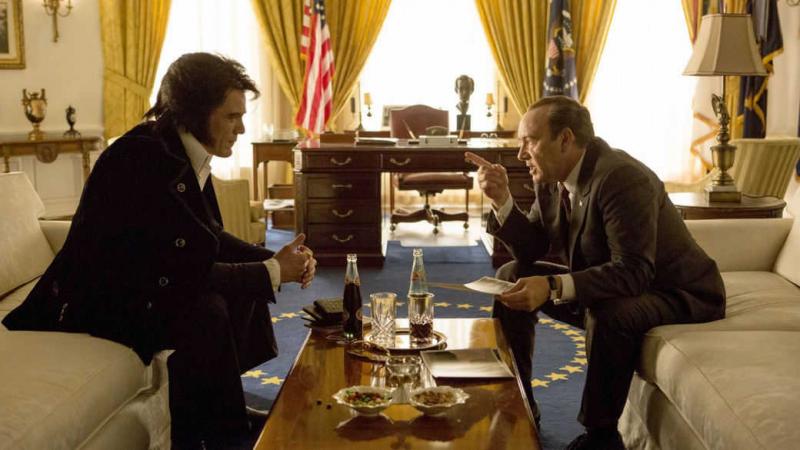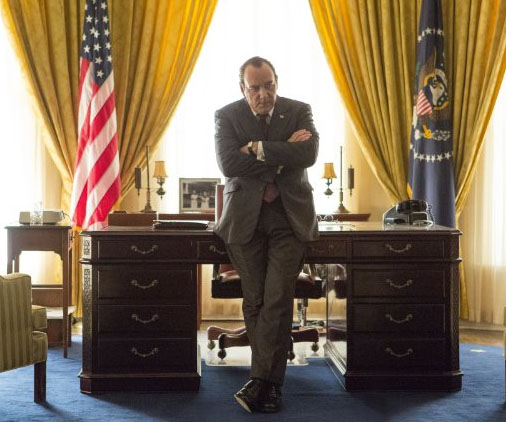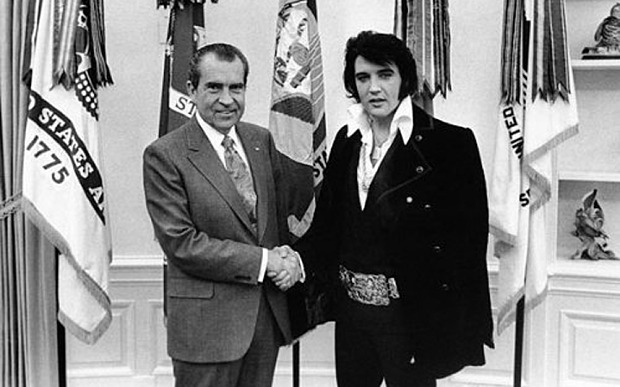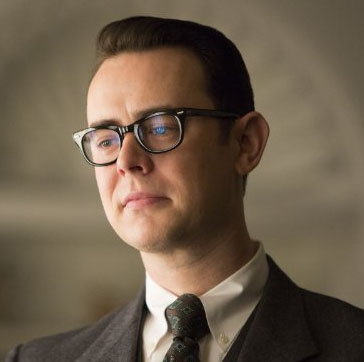Elvis & Nixon | reviews, news & interviews
Elvis & Nixon
Elvis & Nixon
Tricky Dicky meets the Pelvis in smart satirical fantasy

Shamed and reviled, Richard Nixon had the misfortune (albeit self-authored) to be the star of one of the murkiest chapters in American Presidential history. It's not much compensation for him now, but he has become something of a goldmine for film-makers.
Anthony Hopkins went to town on him in Nixon. Zack Snyder brought us a grotesque, parallel-universe Nixon in Watchmen. Frank Langella revelled in the wily, devious President in Frost / Nixon. Now here's Kevin Spacey with what could be the best Nixon yet, in Liza Johnson's delicious fantasy-satire about the day when the President met the King.
 There's just enough truth in the real-life story of how Elvis Presley visited Nixon at the White House in December 1970 to get himself recruited as a "Federal Agent at Large" to hang the screenplay on, and there's a famous photograph of the pair to prove it happened (below). However, no factual transcript of what they said to each other has survived to cramp the style of screenwriters Susan Stadner, Carly Elwes and Joey Sagal. There was an earlier version of the story in Elvis Meets Nixon (1998), where the Prez was played by Bob Gunton, but this one pips it to the gold medal for its strength-in-depth cast and its skilful judgment of just how much fantasy the facts can take.
There's just enough truth in the real-life story of how Elvis Presley visited Nixon at the White House in December 1970 to get himself recruited as a "Federal Agent at Large" to hang the screenplay on, and there's a famous photograph of the pair to prove it happened (below). However, no factual transcript of what they said to each other has survived to cramp the style of screenwriters Susan Stadner, Carly Elwes and Joey Sagal. There was an earlier version of the story in Elvis Meets Nixon (1998), where the Prez was played by Bob Gunton, but this one pips it to the gold medal for its strength-in-depth cast and its skilful judgment of just how much fantasy the facts can take.
Aside from the writing, it's the casting that counts. Spacey has rarely been better, not even as the black-hearted Frank Underwood in House of Cards, and the way he catches Nixon's portentous way of speaking and his heavy, round-shouldered gait, with one hand behind his back, is brilliantly persuasive.
Michael Shannon was an oblique choice to play the King of Rock'n'Roll – too weird, too dark, too quirky, you'd suspect – but only a few minutes in you begin to discern the outlines of Elvis beneath Shannon's skin. He doesn't really look like him, but he makes you feel Elvis's assumption of his own specialness and the extent of his detachment from everyday mundanity. And, for that matter, his blithe self-centredness.
 For instance, having dragged his old buddy Jerry Schilling (Alex Pettyfer) to Washington DC from his job at Paramount studios in LA, Elvis has no conception of Schilling's commitment to his job, nor any sense of why it's vital to him to get back to LA to tell his girlfriend's parents he wants to marry their daughter.
For instance, having dragged his old buddy Jerry Schilling (Alex Pettyfer) to Washington DC from his job at Paramount studios in LA, Elvis has no conception of Schilling's commitment to his job, nor any sense of why it's vital to him to get back to LA to tell his girlfriend's parents he wants to marry their daughter.
Shrewdly, much of Elvis's impact is conveyed by people's responses to him, like the look on the face of the check-in girl at Memphis airport when the King strolls up to the desk to buy a ticket, or the way Mary Anne Peterson (Ahna O'Reilly) of the Bureau of Narcotics and Dangerous Drugs dissolves into giggling fandom when the legendary entertainer walks in and asks if he can get an agent's badge.
 Elvis's quest for the badge – he had developed an irrational desire to do his bit to eradicate both Communism and the drugs menace he believed was destroying America's youth, while somehow overlooking his own colossal ingestion of amphetamines, tranquillisers and barbiturates – is the MacGuffin of the piece. Presley, who was evidently a law-enforcement groupie, rambles delusionally about wanting to go undercover, infiltrate bands like the Rolling Stones and the Grateful Dead and bust them for drug-taking, but it seems revealing of America's divided soul at the end of the Sixties that this deluded pop icon should end up sharing a strangely intimate moment with a paranoid President utterly uncomprehending of youth culture. Somehow, the resentfully self-pitying Nixon finds common ground with Elvis because they're both self-made men from humble backgrounds. Presley, meanwhile, exercises superstar patronage by signing autographs for Nixon's daughter and alarms the President with his preposterous karate moves.
Elvis's quest for the badge – he had developed an irrational desire to do his bit to eradicate both Communism and the drugs menace he believed was destroying America's youth, while somehow overlooking his own colossal ingestion of amphetamines, tranquillisers and barbiturates – is the MacGuffin of the piece. Presley, who was evidently a law-enforcement groupie, rambles delusionally about wanting to go undercover, infiltrate bands like the Rolling Stones and the Grateful Dead and bust them for drug-taking, but it seems revealing of America's divided soul at the end of the Sixties that this deluded pop icon should end up sharing a strangely intimate moment with a paranoid President utterly uncomprehending of youth culture. Somehow, the resentfully self-pitying Nixon finds common ground with Elvis because they're both self-made men from humble backgrounds. Presley, meanwhile, exercises superstar patronage by signing autographs for Nixon's daughter and alarms the President with his preposterous karate moves.
There's smart support from Nixon's political entourage, notably Colin Hanks as Egil "Bud" Krogh (pictured above) and Tate Donovan as Chief of Staff HR Haldeman (these two grasp that cuddling up to Presley might win them votes among young people and Southerners), and the deployment of grainy Seventies-era footage and a tasty selection of period songs from Creedence Clearwater, Sam & Dave and others evokes a tang of authenticity. This is a movie that just works, and it's a joy.
The future of Arts Journalism
You can stop theartsdesk.com closing!
We urgently need financing to survive. Our fundraising drive has thus far raised £49,000 but we need to reach £100,000 or we will be forced to close. Please contribute here: https://gofund.me/c3f6033d
And if you can forward this information to anyone who might assist, we’d be grateful.

Subscribe to theartsdesk.com
Thank you for continuing to read our work on theartsdesk.com. For unlimited access to every article in its entirety, including our archive of more than 15,000 pieces, we're asking for £5 per month or £40 per year. We feel it's a very good deal, and hope you do too.
To take a subscription now simply click here.
And if you're looking for that extra gift for a friend or family member, why not treat them to a theartsdesk.com gift subscription?
more Film
 Harvest review - blood, barley and adaptation
An incandescent novel struggles to light up the screen
Harvest review - blood, barley and adaptation
An incandescent novel struggles to light up the screen
 Friendship review - toxic buddy alert
Dark comedy stars Tim Robinson as a social misfit with cringe benefits
Friendship review - toxic buddy alert
Dark comedy stars Tim Robinson as a social misfit with cringe benefits
 S/HE IS STILL HER/E - The Official Genesis P-Orridge Documentary review - a shapeshifting open window onto a counter-cultural radical
Intimate portrait of the Throbbing Gristle & Psychic TV antagonist
S/HE IS STILL HER/E - The Official Genesis P-Orridge Documentary review - a shapeshifting open window onto a counter-cultural radical
Intimate portrait of the Throbbing Gristle & Psychic TV antagonist
 Blu-ray: Heart of Stone
Deliciously dark fairy tale from post-war Eastern Europe
Blu-ray: Heart of Stone
Deliciously dark fairy tale from post-war Eastern Europe
 Superman review - America's ultimate immigrant
James Gunn's over-stuffed reboot stutters towards wonder
Superman review - America's ultimate immigrant
James Gunn's over-stuffed reboot stutters towards wonder
 The Other Way Around review - teasing Spanish study of a breakup with unexpected depth
Jonás Trueba's film holds the romcom up to the light for playful scrutiny
The Other Way Around review - teasing Spanish study of a breakup with unexpected depth
Jonás Trueba's film holds the romcom up to the light for playful scrutiny
 The Road to Patagonia review - journey to the end of the world
In search of love and the meaning of life on the boho surf trail
The Road to Patagonia review - journey to the end of the world
In search of love and the meaning of life on the boho surf trail
 theartsdesk Q&A: actor Emma Mackey on 'Hot Milk' and life education
The Anglo-French star of 'Sex Education' talks about her new film’s turbulent mother-daughter bind
theartsdesk Q&A: actor Emma Mackey on 'Hot Milk' and life education
The Anglo-French star of 'Sex Education' talks about her new film’s turbulent mother-daughter bind
 Blu-ray: A Hard Day's Night
The 'Citizen Kane' of jukebox musicals? Richard Lester's film captures Beatlemania in full flight
Blu-ray: A Hard Day's Night
The 'Citizen Kane' of jukebox musicals? Richard Lester's film captures Beatlemania in full flight
 Hot Milk review - a mother of a problem
Emma Mackey shines as a daughter drawn to the deep end of a family trauma
Hot Milk review - a mother of a problem
Emma Mackey shines as a daughter drawn to the deep end of a family trauma
 The Shrouds review - he wouldn't let it lie
More from the gruesome internal affairs department of David Cronenberg
The Shrouds review - he wouldn't let it lie
More from the gruesome internal affairs department of David Cronenberg
 Jurassic World Rebirth review - prehistoric franchise gets a new lease of life
Scarlett Johansson shines in roller-coaster dino-romp
Jurassic World Rebirth review - prehistoric franchise gets a new lease of life
Scarlett Johansson shines in roller-coaster dino-romp

Add comment